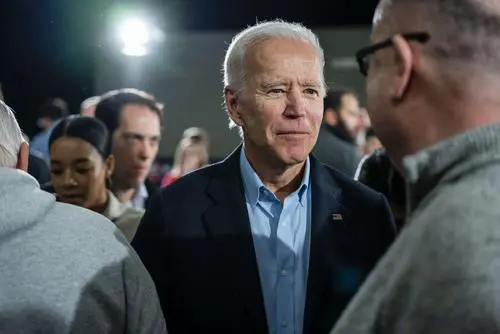Former U.S. Vice President Joe Biden, who won most states in critical Super Tuesday's Democratic primaries, grabbed the endorsement of former New York City Mayor Michael Bloomberg, who dropped out of the race, on Wednesday.
Bloomberg's decision came after a disappointing finish in the Democratic primaries on Tuesday, in which he only won American Samoa.
"I'm a believer in using data to inform decisions. After yesterday's results, the delegate math has become virtually impossible -- and a viable path to the nomination no longer exists," Bloomberg said in a statement.
The billionaire entrepreneur, who made a late entry into the presidential race last year and has spent over 500 million U.S. dollars on advertising, also said that he's glad to endorse Biden, a moderate political veteran who won 10 of the 14 states voting on Tuesday.
A champion of progressive policies, including Medicare for All, Senator Bernie Sanders of Vermont finished second but scored a major win in California, the state with the most pledged delegates to the Democratic National Convention (DNC) to be held in July in Milwaukee, Wisconsin.
Biden, in a tweet on Wednesday, thanked Bloomberg for his endorsement.
"This race is bigger than candidates and bigger than politics," Biden added.
David Axelrod, director of the University of Chicago's Institute of Politics, said Bloomberg's departure "was expected."
"He's a flinty-eyed realist and the numbers weren't there," said the former chief strategist for Barack Obama's presidential campaigns. "The big news was his quick pledge to back Biden, with all the material support that implies. It could turn out to be one of the most meaningful developments of 2020."
Sitting President Donald Trump, who is projected to easily win the Republican Party's primaries on Tuesday, weighed in on Bloomberg's exit and lashed out at Biden with a series of tweets on Wednesday.
But he also acknowledged Biden's victory on the Democratic side, calling it a "great comeback," when speaking to reporters at the White House.
Senator Elizabeth Warren of Massachusetts and U.S. Congresswoman Tulsi Gabbard of Hawaii are still in the Democratic primary race, as a Biden-Sanders matchup took shape.
"Last night, we fell well short of viability goals and projections, and we are disappointed in the results," Warren campaign manager Roger Lau wrote in an email to staff. "This decision is in her hands."
Speaking to a press conference at his campaign headquarters in Burlington, Vermont on Wednesday, Sanders predicted that he and Biden would be "basically neck and neck" for the remainder of the primary, while accusing the former vice president of running a campaign "obviously heavily supported by the corporate establishment."
"Joe and I have a very different vision for the future of this country. And Joe and I are running very different campaigns," Sanders said. "My hope is that in the coming months we will be able to debate and discuss the very significant differences that we have."
Biden struggled through the Democratic primary's early races, but he won a commanding victory in South Carolina late last month, where he was powered overwhelmingly by the support of African American voters.
Riding on the momentum, Biden was also boosted by a wave of big-name endorsements shortly before Super Tuesday, including several former Democratic presidential hopefuls in this cycle, paving the way for his strong resurgence.
Responding to Sanders' criticism, Biden said on Wednesday that "the establishment are all those hardworking, middle class people, those African Americans ... they are the establishment."
The next Democratic primaries will take place on March 10 for voters of six states to cast ballot for their preferred presidential candidate this year.
The Super Tuesday Democratic primary decided over 1,300 pledged delegates to the DNC, or roughly a third of the total. Typically, a candidate is only eligible to receive a share of the pledged delegates at stake if they win at least 15 percent of votes cast in a primary or caucus.
To win the Democratic presidential nomination, a candidate must receive support from a majority of all the 3,979 pledged delegates on the first ballot of the DNC, which election officials said must be at least 1,991 delegates.
Julian Zelizer, a professor of history and public affairs at Princeton University, tweeted on Wednesday that there are "many important contests still ahead."
"Everyone should see by now that uncertainty is the only certainty," Zelizer stressed.
The Republican Party is expected to nominate Trump for a second term during August's national convention in Charlotte, North Carolina.
The 2020 U.S. presidential election will take place on Nov. 3.
(ASIA PACIFIC DAILY)
 简体中文
简体中文

